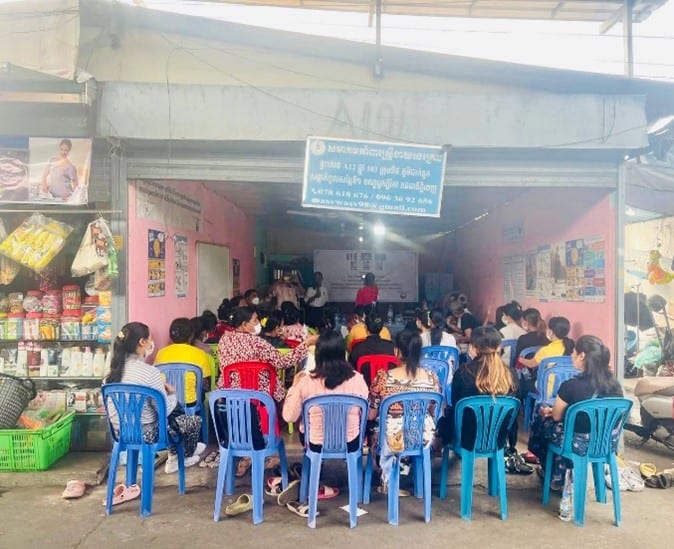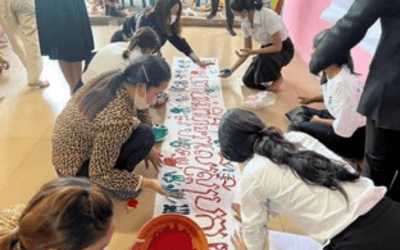The Association to Support Vulnerable Women is an independent organization work to support more three thousand sex workers in Phnom Penh every year for advocating and protecting their recognition as workers, their rights and social inclusion.
The Association to Support Vulnerable Women (ASVW), known locally as the Cambodian Prostitute’s Union (CPU) is a representative, independent and worker-led organisation of sex workers in Phnom Penh. Supported by Union Aid Abroad – APHEDA since their establishment in 1998, CPU was set up by sex workers to help promote and protect their rights as workers, provide information about preventing HIV/AIDS, and help their members access social, health and legal services. The organisation has played an important role in reducing the rates of HIV/AIDS in Cambodia, which at one time had the highest rates of infection in Asia, through outreach work and distributing condoms. It has also advocated for social inclusion and challenged ambiguous and draconian laws introduced in 2008 that criminalised sex work under the guise of stopping trafficking.
Twenty-five years since their founding, CPU continues to provide crucial support, training and solidarity to Phnom Penh’s sex workers. Starting a new three-year project in July last year, APHEDA’s partnership with CPU aims to increase their member’s access to local services -including legal, health and education services, and to claim their rights as workers, as women and as Cambodian citizens by increasing CPU’s organisational and organising capacity.
Overcoming hardship
Despite sex work being widely prevalent, independent sex workers are some of Cambodia’s most vulnerable and exploited workers, and the last few years has been particularly tough. Many come from regional provinces to the capital Phnom Penh where they work from bars, restaurants, massage parlours and KTVs (karaoke bars) or rent small private rooms to earn enough money to support themselves and their families. Operating in a legal grey area, these venues face regular police crackdowns, with workers often forced to pay bribes, face arrest or move on.
The COVID-19 pandemic made things much harder, with restrictions on movement and curfews disproportionately affecting the hospitality and entertainment industries. A study looking at the industry by CPU’s ally advocacy group Women’s Network for Unity (WNU) found that 93% of surveyed sex workers said their livelihoods were severely impacted by the outbreak, with 50% losing their income completely, and 37% making less than USD$20 per month. Unable to earn a living and falling through the cracks of the government’s COVID-19 emergency social security, many women ended up working as “freelancers” on the streets, especially around tourist areas near the Royal Palace and Wat Phnom temple. Isolated, transient, at risk of illness and with even poorer access to services and support, street-based sex workers remain particularly vulnerable to exploitation and violence from clientele, and harassment, bribes and arrest by authorities eager to move them on from tourist areas.
Providing support and solidarity
While entertainment venues have now reopened, the crackdowns continue, and sex workers continue to face discrimination and exploitation. Working with limited resources and through many obstacles, including a fire that destroyed their office in 2020, CPU has managed to maintain support for its members and continue to be a leading voice for sex workers in Cambodia.
Despite the difficulties inherent in organising a highly transient and stigmatised workforce, in the past year they have increased their membership to 728 women, with a total reach of more 3250 sex workers in Phnom Penh. Facilitating peer workers to provide support to members across nine target locations across the city, they held workshops to train 58 core members as outreach workers. CPU distributed over 8000 boxes of condoms, helped more than 378 members to access HIV/AIDS, STI and reproductive health services and 56 women and three children to access public services, including health, education and social security, by facilitating the process of issuing birth certificates and ID Poor cards. They collaborated with allies to successfully advocate for the release of four members arrested and detained by the police and secured additional funds to provide food and financial support to 30 sex workers who were experiencing extreme hardship. They also supported 60 members’ children to attend school, including providing transport and supplies.
“Be Brave, Speak Out”
As well as providing direct support to their members and their families, CPU regularly host outreach and campaign activities in the local community where they live and work to raise awareness about issues that affect their members, like unequal access to social security and violence against sex workers, and the unclear and unfair laws that enable these injustices to continue. Using International dates like International Women’s Day (8 March), World Aids Day (1 December) and International Day to End Violence Against Sex Workers (17 December – also known as Red Umbrella Day) to engage their members and communities, they come together to celebrate their achievements, call out discrimination and provide information to their members about key services, like identity documents, which can help them access amenities and prevent them from being sent back to the provinces during police crackdowns. During these events, participants are reminded to ‘be brave, to speak out’ and that CPU is there to help, ensuring members that they are not alone in their struggles.
Looking forward
With your support, CPU will continue their crucial core work supporting Phnom Penh’s sex workers, their families and communities by providing worker education, access to legal and health services, documenting cases of violence against women, conducting home and community care visits, distributing condoms, and supporting sex workers to secure access to education for their children. To support this, they are in the process of training a new project coordinator, looking for a new, more suitable office and will continue to focus on building their membership and organisational capacity.


